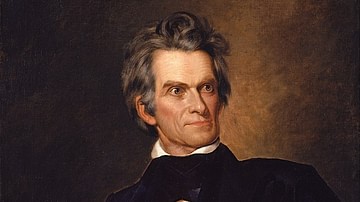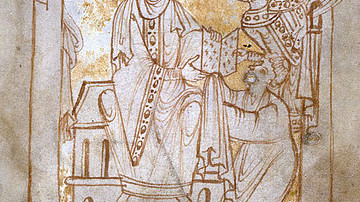Latest Content
Featured Definition

Definition
Ancient Sicily
The Mediterranean island of Sicily, with its natural resources and strategic position on ancient trading routes, aroused the intense interest of successive...
Featured Image

Image
Unique Structures at Herod's Harbor
As part of Herod the Great's building program, besides the unattached edifices at the entrance to Herod's Harbor, there is material evidence for two...
Free for the World, Supported by You
World History Encyclopedia is a non-profit organization. Please support free history education for millions of learners worldwide for only $5 per month by becoming a member. Thank you!
World History Encyclopedia is a non-profit organization. Please support free history education for millions of learners worldwide for only $5 per month by becoming a member. Thank you!
Become a Member Donate
Article
The Transatlantic Zeppelins - A Golden Age of Air Travel
Transatlantic Zeppelins carried passengers in relative luxury between Germany and New York or Rio de Janeiro during the 1920s and 1930s. The airships...

Definition
John C. Calhoun - Champion of the Antebellum South
John C. Calhoun (1782-1850) was an American lawyer and statesman, one of the key political figures of the Antebellum Era. Initially a nationalist, Calhoun...

Article
The Zeppelin Bombing Raids of WWI
Zeppelin airships were used by Germany to attack its enemies on all fronts during the First World War (1914-18). Bombing raids, usually conducted at...

Article
Herod the Great's Building Program
Herod the Great was the king of Judea from 37-4 BCE. As a client king of Rome, Herod's moniker as "Great" was due more to his grand building program...

Definition
Emma of Normandy
Emma of Normandy (died 1052), the wife of King Aethelred the Unready from 1002 to 1016 and then the wife of King Cnut from 1017 to 1035, was a dominant...

Definition
William Shakespeare
William Shakespeare (1564-1616) was an English poet, playwright, and actor who flourished during the late Elizabethan and early Jacobean eras. Known...

Definition
James K. Polk
James K. Polk (1795-1849) was an American lawyer and politician who served as the eleventh president of the United States. A protégé of Andrew Jackson...

Definition
Mexican-American War
The Mexican-American War (1846-1848) was a conflict between the United States and Mexico, sparked by the US annexation of Texas in 1845. Hoping to seize...

Image Gallery
The Life of Alfred the Great in 10 Monuments
Alfred the Great ruled the Kingdom of Wessex (England south of the Thames) from 871 to 899. Leading the English resistance to the Vikings, Alfred won...

Definition
John Tyler - The Pariah President of the US
John Tyler (1790-1862) was an American lawyer and politician who served as the tenth president of the United States. His presidency was a tumultuous...

Definition
John Brown - The Flame that Ignited Civil War
John Brown (1800-1859) was a militant abolitionist best known for the part he played in the violence of Bleeding Kansas (1854-1859) and his raid on...

Definition
William Henry Harrison - The One-Month US President
William Henry Harrison (1773-1841) was an American statesman and military general who served as the ninth president of the United States. A member of...

Definition
Aethelstan
Aethelstan was the first King of England, ruling from 927 to 939. The son of Edward the Elder (reign 899-924) and grandson of Alfred the Great (reign...

Definition
Tsar Nicholas II - Last of the Romanovs
Tsar Nicholas II (reign 1894-1917) was the last of the Romanov emperors, murdered along with his family during the turmoil of the Russian Revolution...

Definition
Italo-Ethiopian Wars
Italy occupied Ethiopia for five years, from 1935 to 1941, following a mass-scale invasion launched by the fascist dictator Benito Mussolini (1883-1945...

Definition
Cleopatra of Macedon
Cleopatra of Macedon (355/4-308 BCE), daughter of Philip II of Macedon (reign 359-336 BCE) and his Molossian queen, Olympias of Epirus (c. 375-316 BCE...